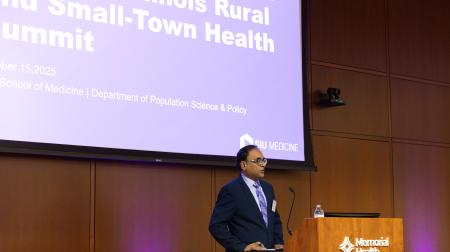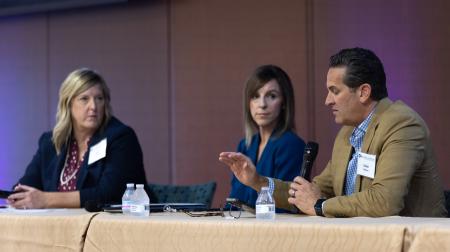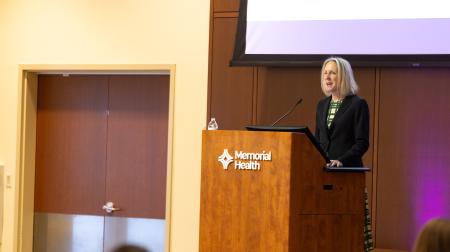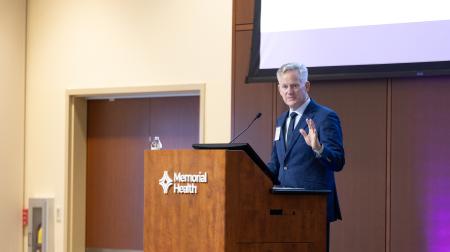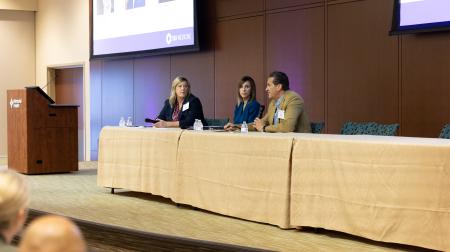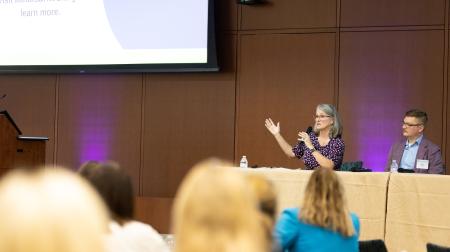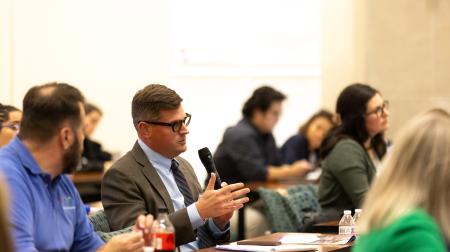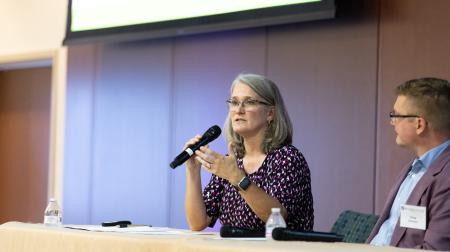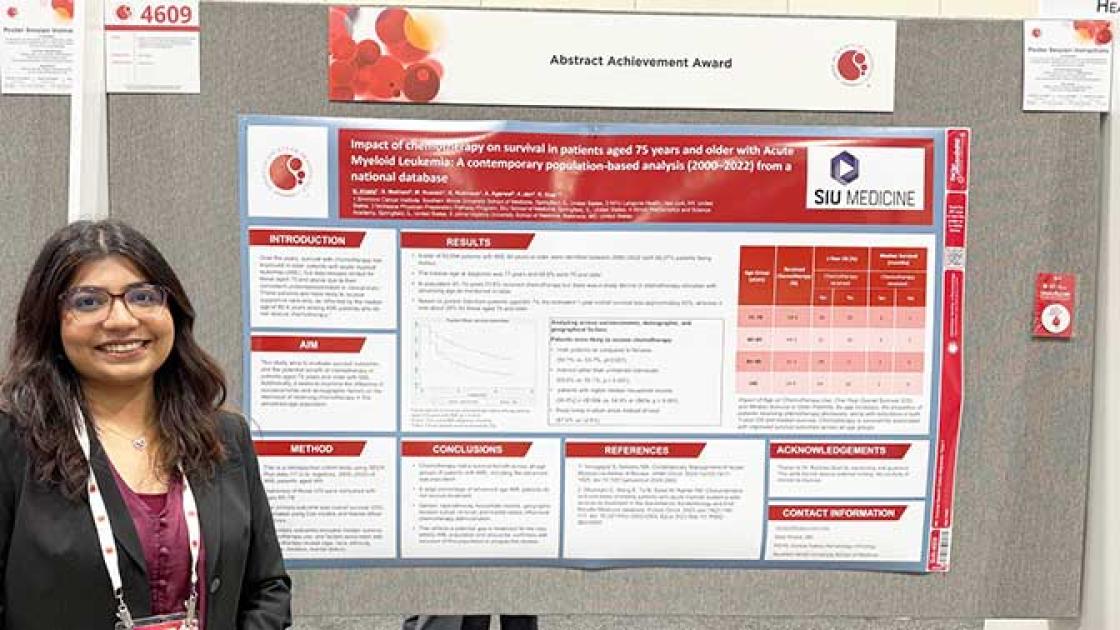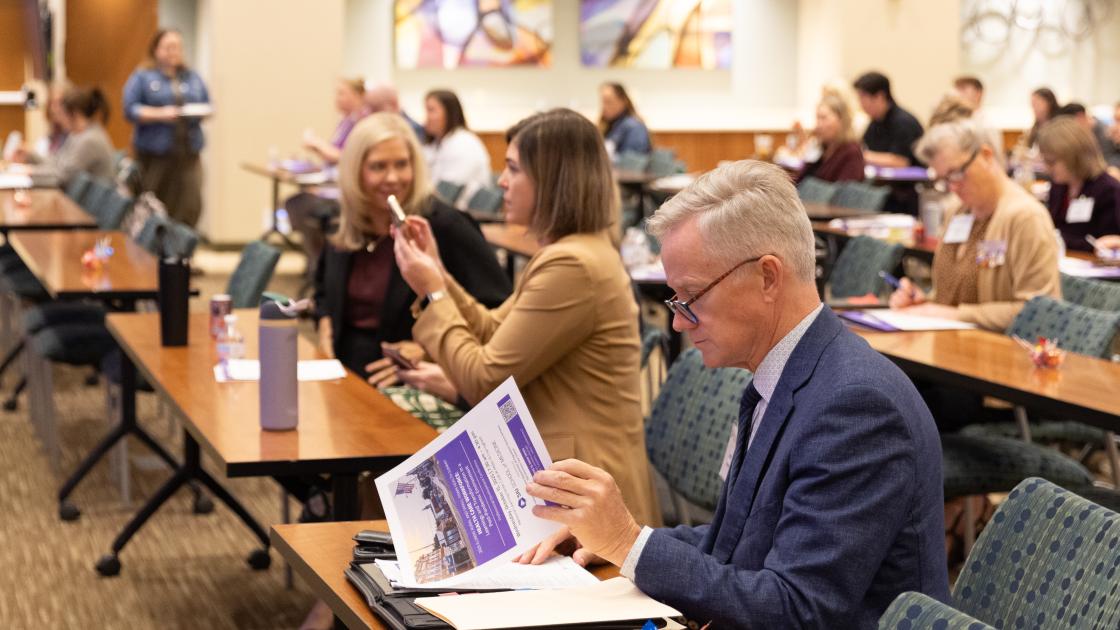
Partnering to strengthen rural health
Insights from the 2025 Illinois Rural and Small-Town Health Summit
Public health leaders from across Illinois gathered at Southern Illinois University School of Medicine for the 2025 Rural and Small-Town Health Summit. The goal was clear: find practical ways to strengthen the health care workforce, improve access and tackle persistent challenges in rural and underserved communities.
The day opened with welcomes from John M. Flack, MD, chair of Population Science and Policy; Jerry Kruse, MD, MSPH, dean and provost of SIU School of Medicine; and Hannah Brenner Johnson, JD, dean of SIU Simmons Law School.
Flack emphasized that solving public health challenges requires collaboration across disciplines. “Collaboration across medicine, law and policy is essential if we are to address the complexities of public health today,” he said. Kruse highlighted the enduring workforce shortages and disparities that burden rural communities, while Johnson underscored the role of legal frameworks in shaping health outcomes.
With this call for cross-sector innovation, the summit moved into the day’s sessions, beginning with insights from John Simmons, JD, chair of Simmons Hanly Conroy, LLP, who explored parallels between workforce challenges in rural health care and the legal profession. He described how small, resource-limited practices adapted rapidly during the pandemic to retain staff and maintain services. “We’ve learned that adaptability and creative workforce solutions are not optional; they’re survival tools,” Simmons said, stressing mentorship and professional development as keys to staff retention.
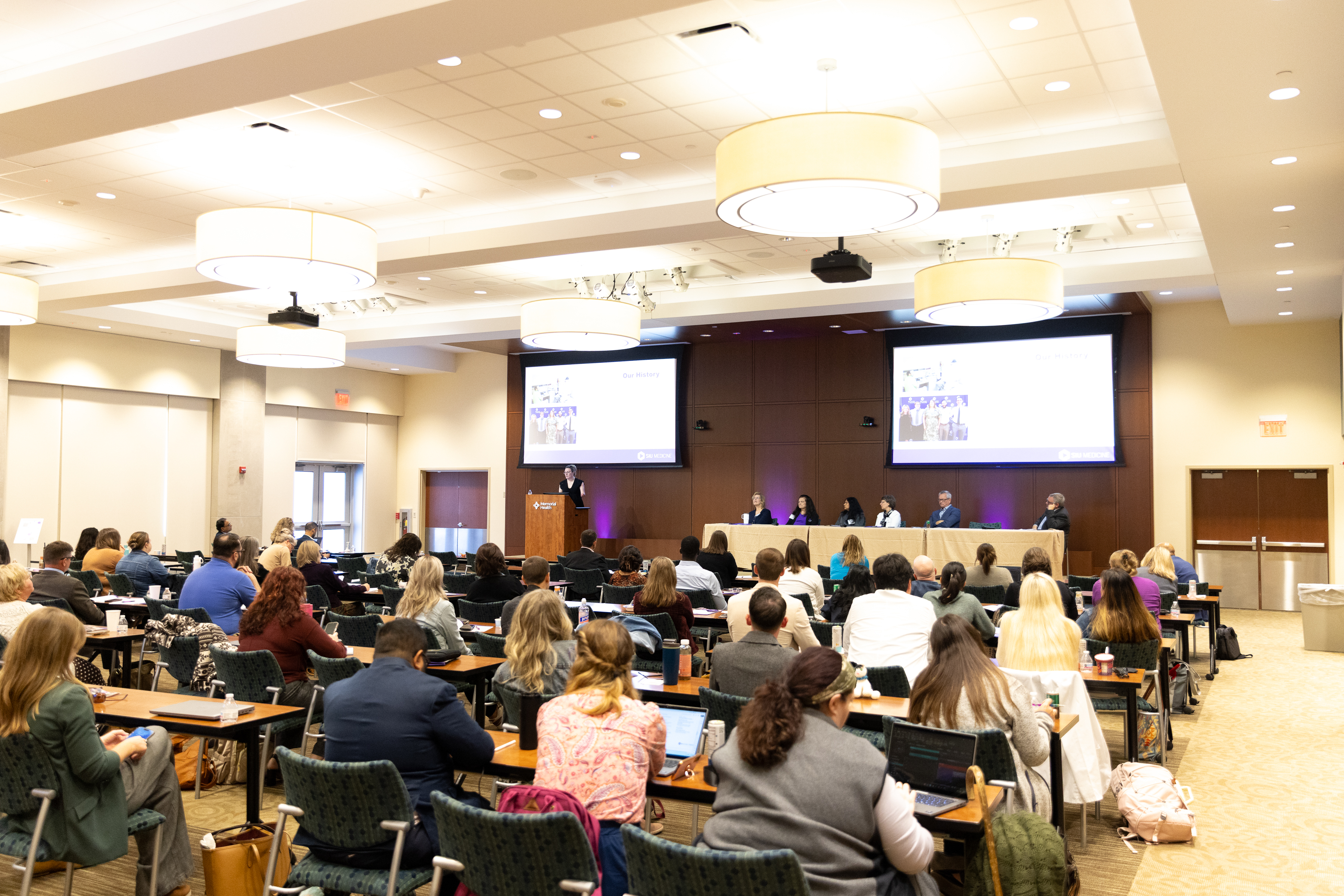 Next, a panel led by Janet Albers, MD, chair of SIU Family Medicine, examined how primary care systems are adapting post-pandemic. Rising patient demand and clinician shortages dominated the conversation. Iris Wesley, CEO of the SIU Medicine Federally Qualified Health Center, shared how flexible staffing models and cross-training help her team maintain service continuity. William Dixon, MD, SIU Residency Program director and Akshra Verma, MD, SIU ambulatory section chief, addressed burnout and retention struggles among clinicians.
Next, a panel led by Janet Albers, MD, chair of SIU Family Medicine, examined how primary care systems are adapting post-pandemic. Rising patient demand and clinician shortages dominated the conversation. Iris Wesley, CEO of the SIU Medicine Federally Qualified Health Center, shared how flexible staffing models and cross-training help her team maintain service continuity. William Dixon, MD, SIU Residency Program director and Akshra Verma, MD, SIU ambulatory section chief, addressed burnout and retention struggles among clinicians.
Panel members Sandra Yockey, MD, SIU Pediatrics and Jennifer Rose, MD, SIU Family Medicine and Donald Diemer, DHS, PA-C, chair of Physician Assistant Medicine at SIU Family Medicine, outlined programs to cultivate the next generation of rural practitioners through mentoring, residencies and community engagement. Diemer stressed the need to find ways to engage students even younger to spark an early interest in health careers.
“Recruitment and retention are no longer just HR issues; they are central to community health,” Albers said.
Exploring policy
In a session moderated by Christopher McDowell, MD, executive associate dean at SIU School of Medicine, Zil Joyce Dixon Romero, government affairs manager, National Rural Health Association and state Rep. William Hauter, MD, provided updates on federal and state initiatives impacting rural health. Romero noted the growth in funding for telehealth, workforce development and infrastructure and warned that accessing programs requires navigation and strategy.
Illinois hospitals offered concrete solutions.
Dolan Dalpoas, MPH, president and CEO of Lincoln Memorial Hospital and Allison Sours, MBA, COO of Graham Health Network, shared workforce innovations from rural hospitals, including collaborative staffing networks that reduce burnout and ensure continuity of care. Sours highlighted local talent pipelines for nurses and allied health professionals, emphasizing that recruitment alone isn’t enough. Workforce development is necessary, too.
“We can’t just recruit staff. We have to grow them locally and keep them engaged,” Dalpoas said.
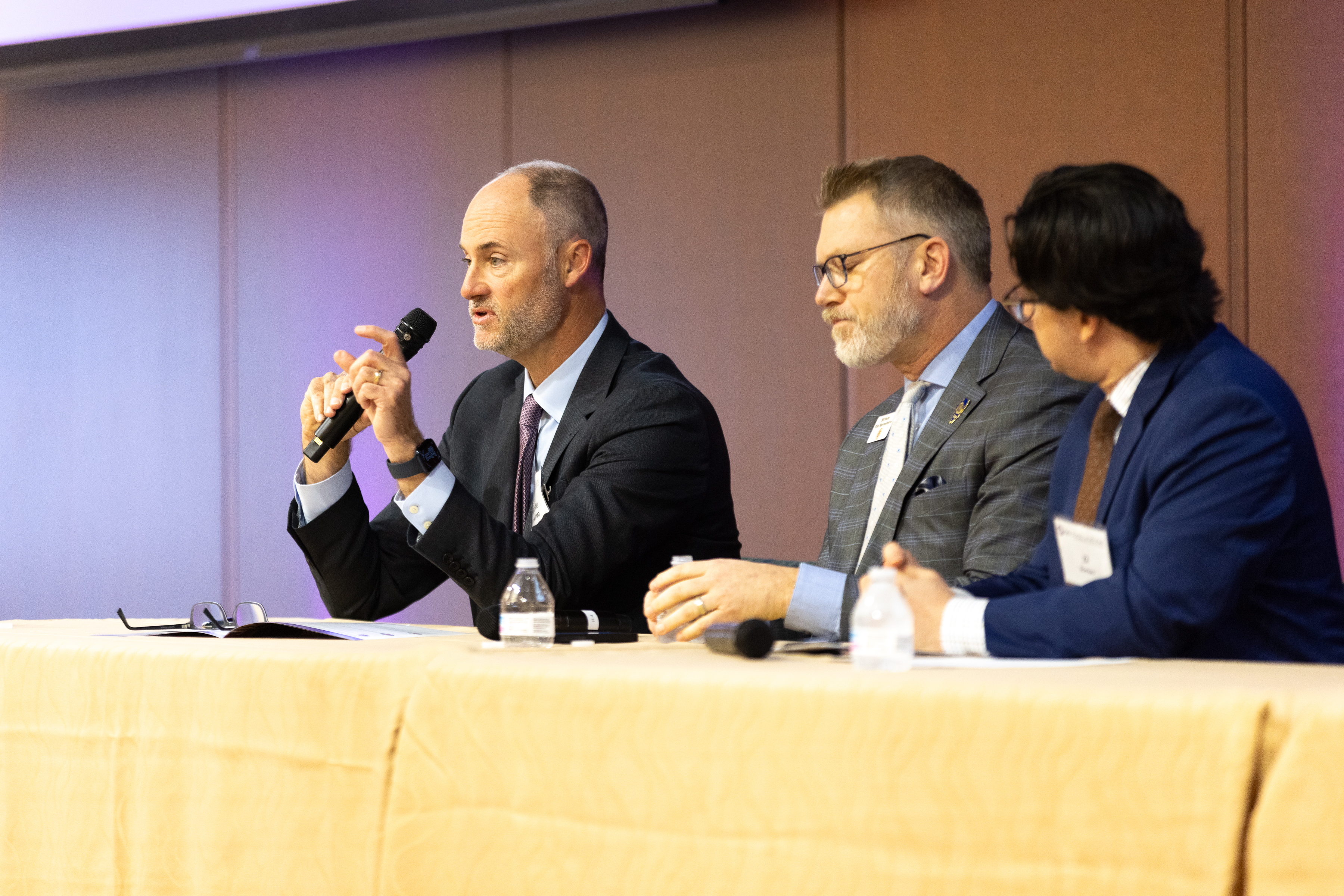 Behavioral health
Behavioral health
Kari Wolf, MD, CEO of the Behavioral Health Workforce Center, moderated a panel featuring Sen. Laura Fine and Tony Ohlhausen from NAMI Illinois. Panelists highlighted the increasing demand for mental health and addiction services in rural areas. Fine outlined state-level funding and training programs and discussed legislative priorities to expand access. Wolf stressed that integrating behavioral health into primary care is essential. “Behavioral health is foundational to overall community health,” she said.
Illinois workforce initiatives
Kristin Rzeczkowski, MA, workforce director for the Center for Rural Health at the Illinois Department of Public Health, outlined strategies to recruit, retain and train public health professionals across the state, particularly in fragmented and underserved areas. Around a third of public health employees have considered leaving their roles in recent years, highlighting the urgency of sustainable workforce planning. Rzeczkowski detailed a three-tiered training program focused on leadership, supervisory skills and foundational public health, designed to strengthen capacity at both local and state levels.
Kristen Nolen, Section Chief of the Center for Rural Health at IDPH, highlighted programs targeting rural and underserved areas, including Health Professional Shortage Area (HPSA) designations, loan repayment and scholarship programs and the J-1 Visa Waiver (Conrad 30) Program for foreign medical graduates. Nolen emphasized that shortages affect both rural and urban communities and the state tracks providers meticulously to ensure programs address real gaps.
In closing, Sowmy Thuppal, MD, PhD, urged attendees to invest in workforce development, use data to guide decisions and build partnerships across public health, local agencies and educational institutions.
“Our mission is clear: every Illinois resident deserves high-quality, accessible public health services,” Thuppal said, leaving the room with a roadmap for sustainable, equitable health care.
By the day’s end, participants had not only shared challenges but also highlighted tangible solutions for workforce development, including:
- collaborative staffing
- mentorship pipelines for every career path
- interdisciplinary experiences for health career choices
- legislative support
- targeted training programs
For more information about these efforts, please contact Population Science and Policy at our email (psp@siumed.edu) or call 217-545-7939.

